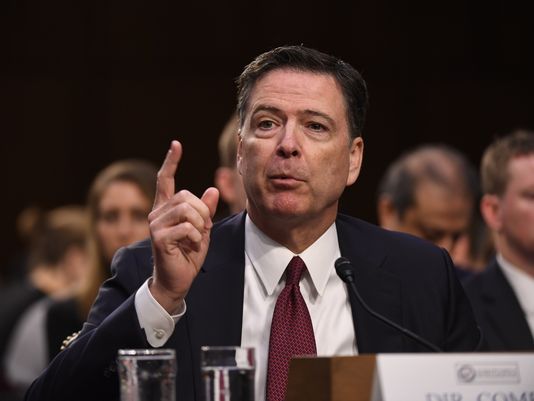Comey: “I take the President at his word — that I was fired because of the Russia investigation.”
Developments on Day 140 of the Trump Administration:
See also Podcasts: Comey Damages Trump — What Happens Next
Podcast: Why Comey’s Testimony Threatens Trump
Comey Further Damages Trump with Testimony
James Comey, fired as FBI Director by Donald Trump last month because of the Trump-Russia inquiry, steps up pressure on the President with blunt, precise testimony to the Senate Intelligence Committee.
Comey built on a nine-page statement, released on Wednesday night, which set out in meticulous detail a record of Trump’s behavior raising serious political and legal questions, with the possibility that the President tried to obstruct justice by limiting the Trump-Russia inquiry. The notes depicted Trump as a man near obsession with whether he was being personally investigated and frustrated that Comey would not make a public statement to that effect.
In almost three hours answering Senators’ questions, Comey made clear that he believed Trump had ordered him to drop the inquiry into former National Security Advisor Michael Flynn, a day after Flynn was dismissed over his contacts with Russian Ambassador Sergei Kislyak and lying about the telephone conversations.
Asked about the reason for his firing by Trump almost three months later, Comey said, “I take the President at his word — that I was fired because of the Russia investigation. Something about the way I was conducting it, the president felt, created pressure on him that he wanted to relieve.”
Comey brought further headlines with his assessment that the Trump Administration had “told lies, plain and simple” and defamed him when it tried to tarnish his reputation after his dismissal on May 9. He did not directly reference Trump’s statement, made to Russian Foreign Minister Sergei Lavrov in the Oval Office the next day, that Comey was “crazy” and a “nut job”, although supportive Senators alluded to the incident.
Comey acknowledged that, from fear that the Trump-Russia investigation would now be pushed aside, he had arranged for friends to contact leading media outlets to summarize his records about conversations with Trump. He has also turned over the memoranda of the conversation to special counsel Robert Mueller, his predecessor as FBI Director.
In a sign that the investigation would now intensify rather than disappear, Comey indicated that it is looking at current Administration officials. He alluded specifically to Attorney General Jeff Sessions while saying that details would have to be given in the closed session held soon after his public appearance.
Some Republican Senators tried to limit Comey’s impact by questioning his interpretation. They tried to portray Trump’s request to drop the investigation as merely an expression of “I hope”, only for the FBI Director to grab the initiative by saying that he interpreted the President’s statement as “direction” for action.
Encouraged by Independent Senator Angus King, “When the president said ‘I hope or I suggest’…would you take that as a directive?”, Comey invoked a reference to a famous 12th-century incident involving England’s King Henry II and the soon-to-be-murdered Archbishop of Canterbury, Thomas à Becket: “Yes. It rings in my ear as, well, ‘Will no one rid me of this meddlesome priest?’.”
The GOP legislators then challenged the former FBI director as to why he did not immediately tell Trump that the President was abusing his authority with the request over Flynn. Comey blunted the attack with the forthright admission that he was stunned by the development:
“I don’t want to…sound like I’m Captain Courageous. I don’t know whether, even if I had the presence of mind, I would have said to the president, “Sir, that’s wrong.”
Instead, realizing that Trump’s request — “we would have dropped an open criminal investigation” — might now have to be a subject of the inquiry, he took the matter back to the FBI.
Comey also turned attention back to Trump on matters such as Trump’s demand for personal loyalty — made in a conversation on January 27, three days after Flynn gave false answers to the FBI — and the President’s Twitter warning, made just after he fired the FBI Director, that he might have secretly recorded their conversations.
“Lordy, I hope there are tapes,” Comey said. “The President surely knows if there are tapes. If there are, my feelings aren’t hurt. Release the tapes.”
As Comey was praised for his appearance, including by Republican members of the committee, the White House scrambled to again deflect attention from Trump and put it on his foe. Deputy Press Secretary Sarah Huckabee Sanders initially offered the defensive reaction, “I can definitely say the president is not a liar.”
Then Trump’s personal attorney Marc Kasowitz, named this week to lead the President’s legal team over the Russia inquiry, read out a statement that threatened Comey with action over the “leaks” of his notes to the media.
But the statement, delayed for almost an hour as the White House tried to organize its lines, appeared to backfire. Even Fox News, a defender of the President, criticized the choice of Kasowitz to read the statement and the refusal to take any questions. Other outlets soon noted that the lawyer got basic facts wrong, including the false assertion about when The New York Times first published a summary of Comey’s recollections of the contacts with Trump.
Trump stayed away from — or was prevented by staff from — reacting on Twitter, although his son Donald Jr. acted as a surrogate with a steady stream of tweets trying to tear down Comey.
Did I miss something or did Comey just say he asked a friend to leak information to the press? Is this a joke?
— Donald Trump Jr. (@DonaldJTrumpJr) June 8, 2017

